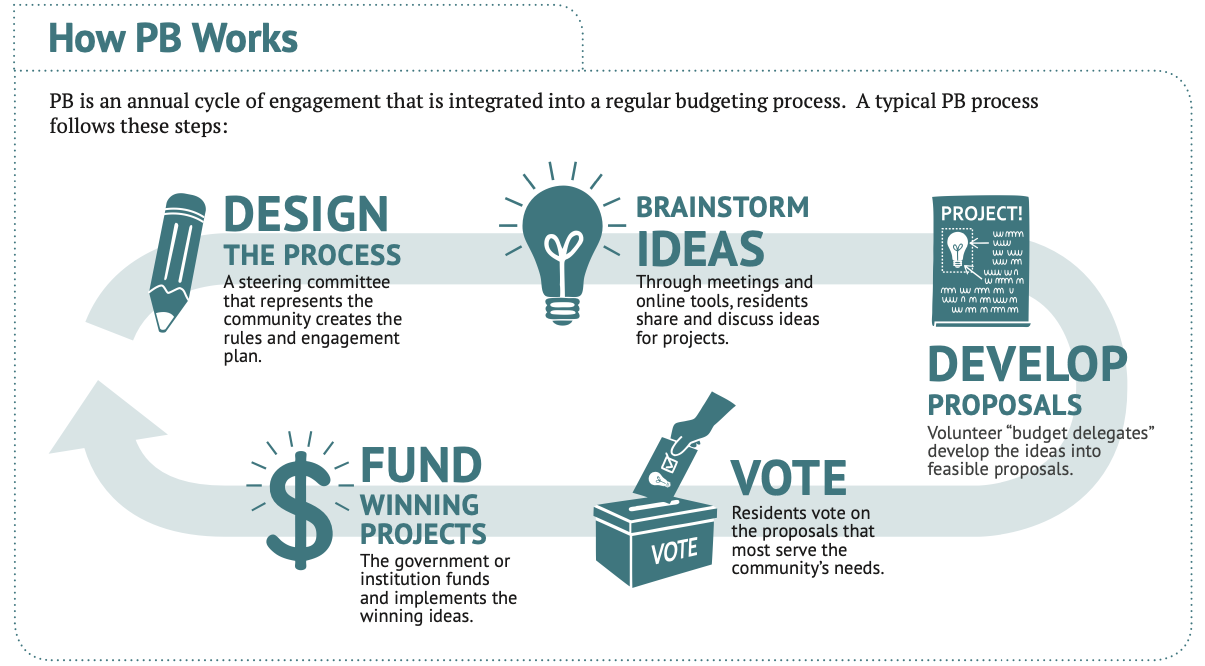Is Participatory Budgeting Coming to a Local Government Near You?

We Are via Getty Images
Amid an influx of billions of federal dollars, some think the tool may see an uptick in use.
You're reading Route Fifty's Public Finance Update. To get the latest on state and local budgets, taxes and other financial matters, you can subscribe here to get this update in your inbox twice each month. You can find a full archive of these newsletters here.
Welcome back to Route Fifty’s Public Finance Update! I’m Elizabeth Daigneau, subbing in for our Public Finance guru Liz Farmer while she’s on vacation, and this week, I’m writing about participatory budgeting.
It’s far from a new idea, and you’ve probably been reading about it for years, but participatory budgeting has slowly been growing since it was first introduced in the U.S. in Chicago in 2009. Many anticipate it is about to see a boom as billions of federal dollars continue to pour into local communities.
For the uninitiated, participatory budgeting is a tool that encourages citizens to decide how a portion of taxpayer money should be spent. It has been utilized by school districts in Arizona and Central Falls, R.I.; counties such as King County, Washington; and countless cities. It started in Brazil in 1989, and to date, roughly 7,000 cities around the world have used the tool, including 29 here in the U.S. where residents have collectively allocated $386 million, according to the nonprofit Participatory Budgeting Project.

Mainly, participatory budgeting is seen as a civic engagement and civic education tool. For the most part, it is used to allocate small pots of money. And it has had a few hiccups: For instance, in Indonesia, low-income neighborhoods received less than their fair share of the participatory budget because of low participation rates. But advocates argue that is more a function of how the process was run than the tool itself.
Right now, participatory budgeting can be seen in action in towns across New England. It’s March, and in New England that’s town meeting season. As registered voters debate and vote on town business, some of them are using participatory budgeting to allocate a portion of that money.
This week, Somerville, Massachusetts, launched its first-ever participatory budgeting process, giving community members a direct say in how $1 million of city funds will be allocated. Residents have until May 20 to submit their ideas, which must serve a public benefit, be a one-time expense, cost less than $1 million, and be located on city property. Somerville will begin implementing the winning projects in October.
“Somerville’s residents are its greatest strength,” Mayor Katjana Ballantyne said in a press release. “Participatory Budgeting empowers our passionate, committed, and innovative community to not only share ideas to improve their neighborhoods, but actually decide which projects are funded.”
Hartford was the first city to use participatory budgeting in Connecticut, where it’s currently budget-planning season for cities and towns across the state. The program, Hartford Decide$, began in 2016 and has since allocated nearly $1.3 million from Hartford’s capital budget.
The city’s school district has used the program as a way to teach students about civic engagement. Many of the winning projects were submitted by students. Any Hartford resident 13 years of age and up, including residents who are not U.S. citizens, can participate. Voters have decided to spend money to improve parks, create community gardens, plant trees at several schools, paint public murals, purchase laptops for libraries, improve senior centers and support several other projects.
But with the influx to local communities of billions in federal dollars through the American Rescue Plan Act (ARPA), the Infrastructure Investment and Jobs Act, and the Inflation Reduction Act, many experts think the time is ripe to adopt the tool.
“The stakes are high in restoring and rebuilding our nation’s crumbling civic, political and economic infrastructures,” wrote Hollie Russon Gilman and Lizbeth Lucero of New America’s Political Reform Program in a recent op-ed. “The long overdue improvements needed in America’s cities and countries call for remodeling how we govern and allocate federal funds across the country.”
ARPA dollars prompted the city of Cleveland to push for a participatory budgeting pilot.
“Cleveland is a city that has one of the higher poverty rates for a city of their size in the United States. They have over 30 percent of their population living below the poverty line,” Kristania De Leon, co-executive director at the Participatory Budgeting Project, said on The Laura Flanders Show's podcast last July. “So when they found out that they were getting American Rescue Plan Act funds allocated to their municipal government, they said, ‘Wait a minute, this is a huge influx of relatively flexible spending, where’s it going to go and who gets to have a say?’”
A community-led push culminated in a proposal by Cleveland Mayor Justin M. Bibb to the city council last year that $5 million in ARPA funds be allocated to pilot the first citywide participatory budgeting process in its history.
ARPA dollars also elicited Nashville’s city council to allocate $10 million this year to its participatory budgeting program, which is in its third year.
In general, there have been several high-profile participatory budgeting projects in the last year.
Seattle’s project claims to be the biggest participatory budgeting process ever in the United States. The city council earmarked approximately $30 million in the 2021 budget to run a participatory budgeting process. The goal is to spend the money on initiatives that reduce police violence, reduce crime, and “creating true community safety through community-led safety programs and new investments.”
And in September, New York City Mayor Eric Adams announced the launch of the first-ever citywide participatory budgeting process. The program builds on a 2021 project that engaged residents of the 33 neighborhoods hardest hit by Covid-19 in a $1.3 million participatory budgeting process. The new program invites all New Yorkers, ages 11 and up, to decide how to spend $5 million of mayoral expense funding to address local community needs citywide.





